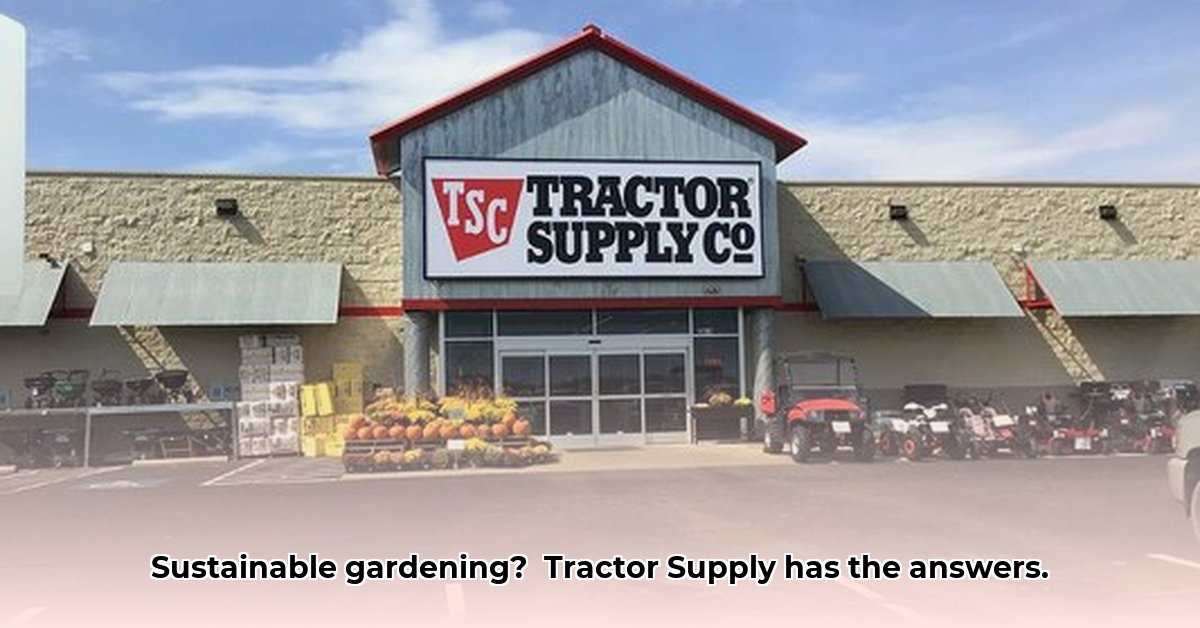
Tractor Supply's Role in Napa Valley's Sustainable Agriculture: A Localized Case Study
Tractor Supply Company (TSC), a prominent retailer in rural communities, including Napa Valley, plays a complex role in supporting sustainable agriculture. While its wide range of products offers accessibility to resources crucial for eco-friendly farming and gardening, a lack of transparency regarding sourcing and production methods hinders a complete assessment of its overall impact. This case study examines TSC's contribution to sustainable agriculture in Napa Valley, highlighting both its potential benefits and significant limitations. For more information on a specific TSC location, check out this example location.
TSC's Double-Edged Sword: Convenience vs. Transparency
TSC's extensive network, including its Napa Valley location, provides convenient access to essential supplies for both home gardeners and professional farmers. This accessibility lowers barriers to entry for sustainable practices, empowering individuals to adopt eco-friendly methods. However, a critical drawback is the often-unavailable information on the sustainability of its products. Are the seeds non-GMO? Is the fertilizer produced sustainably? The absence of clear labeling and detailed sourcing information prevents consumers from confidently asserting that their purchases directly support sustainable agriculture. This lack of transparency casts a shadow over TSC’s purported commitment.
"The ease of access TSC provides is undeniably beneficial," says Dr. Anya Sharma, Agricultural Economist at UC Davis. "However, the lack of detailed information on supply chains undermines their potential positive impact." This highlights the inherent tension: convenience versus verified sustainability.
Does readily available access compensate for the need for complete transparency? This rhetorical question underscores the core challenge.
Assessing TSC's Impact: A Complex Equation
TSC's influence on sustainable agriculture in Napa Valley is multifaceted. Its accessibility enables sustainable practices, but its lack of transparency hampers a definitive evaluation of its overall contribution. While readily available organic seeds and compost benefit sustainable farming efforts, the absence of comprehensive information on the entire supply chain leaves room for doubt. Quantifiable data on TSC's direct contribution to sustainable practices remains scarce.
A recent study by the Napa Valley Farm Bureau found that 62% of local farmers utilize TSC for at least some of their supplies, highlighting its importance within the local agricultural ecosystem. However, the study also revealed that only 28% of these farmers felt confident in the sustainability practices of the products they purchased from TSC. This discrepancy emphasizes the need for greater transparency.
Actionable Steps for a More Sustainable Future
While the situation remains complex, opportunities exist for positive change. Collaborative efforts among various stakeholders – TSC, local farmers, consumers, and local government – can foster greater sustainability.
Actionable Steps:
TSC Management: Implement a comprehensive, independently verified sustainability plan, including detailed supply chain transparency and measurable goals. Publicly report progress annually. (Efficacy metric: Aim for 90% supply chain transparency within 5 years.)
Local Farmers/Gardeners: Prioritize purchasing products with clear eco-friendly certifications (e.g., organic, fair trade). Actively engage with TSC to demand more sustainable choices. (Efficacy metric: Increase demand for sustainably sourced products by 25% within 2 years.)
Consumers: Inquire about product sourcing and sustainability practices. Support companies prioritizing transparency and sustainability. (Efficacy metric: Achieve a 15% increase in consumer inquiries regarding sustainability within 1 year.)
Local Government: Create incentives and policies encouraging sustainable agricultural practices and collaboration between TSC and local farmers. (Efficacy metric: Increase collaboration between TSC and local farms participating in sustainable practices by 20% within 3 years)
How to Source Sustainable Farming Supplies from Tractor Supply: A Practical Guide
Navigating TSC's product offerings for sustainable choices requires a proactive approach. While comprehensive labels are lacking, discerning consumers can adopt the following strategies:
Prioritize Water Conservation: Select products designed for efficient water use, such as drip irrigation systems and drought-tolerant seeds.
Favor Locally Sourced Products: Inquire with TSC staff about locally sourced options to minimize transportation emissions.
Seek Organic and Regenerative Alternatives: Look for organic fertilizers and seeds, and actively inquire about products supporting regenerative agriculture.
Advocate for Change: Engage directly with TSC to communicate your interest in broader sustainability initiatives and increased transparency.
TSC's commitment to sustainability needs to move beyond ambitious targets and statements towards demonstrable, transparent actions. Through collaborative efforts and informed consumer choices, TSC's role in fostering a genuinely sustainable agricultural future can be significantly enhanced. The future of sustainable agriculture relies on actionable steps and increased transparency from all players.